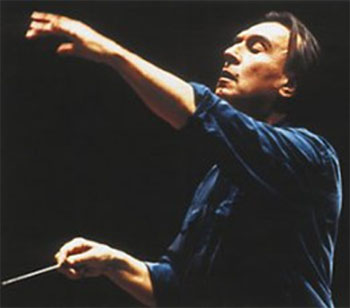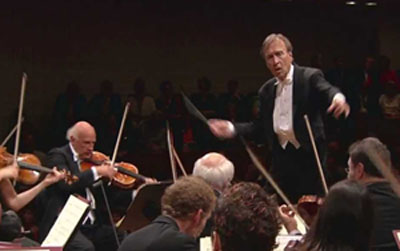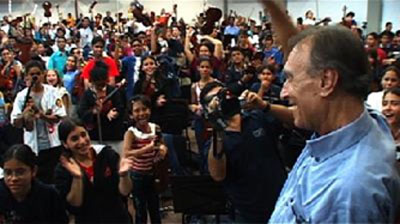|
Celebrating World Music Day: 21st June
Facing Illness with Music
The Story of Claudio Abbado
Surasri Chaudhuri

Human civilization is confronting illness in a way unprecedented in the recent past. Brings back the image of the little girl Sita in Ritwit Ghatak’s movie Subarnarekha, who was singing in an abandoned air-strip, and all of a sudden, Kali the mother-destroyer appeared before her. The frightened little girl realized that it is only a poor man wearing the mask of the Goddess. The singing goes on. When she grows up, we see her singing Bhairavi, the all-encompassing, all-forbidding, all-embracing melody, in the same place, seeking strength to enter a new life. Eternal music that can sustain, enrich and even save lives.
Let him show you everything/ Shining as one – in silence – Rumi
A historic concert in 2004, featuring the Lucerne Festival Orchestra, where musicians are playing their hearts out for the conductor they adore, the frail but astonishingly impassioned and energetic septuagenarian Italian Maestro, Claudio Abbado.
Diagnosed with stomach cancer in 2000, he has recovered after an aggressive surgery and following treatment, and has worked as hard as he could to revive the orchestra. The Gustav Mahler symphony that they are performing, the ninth, reflects life in its entirety. The cruelties, the splendour, the dissatisfactions, the contentment. At the end of the concert, sound transfigures into silence. There is no applause for more than two minutes. The audience and the musicians come together in listening to the silence. Then, gradually they recover from the impact of the music, and a thundering applause follows. Abbado, the shy, introvert conductor takes several awkward bows, a ritual he dislikes intensely. Perhaps inside, he is still listening to the silence, something he learnt in his childhood, when his grandfather would take him for a walk in the mountains, and would ask him to listen to the silence, and the quiet sound of snowfall that scarcely breaks it.

With Lucerne Festival Orchestra
Cut to another concert in Venezuela in 2005, featuring the Latin American Youth Symphony Orchestra, an ensemble of 260 young musicians from different countries of South and Central America. Most of them come from “El Sistema”, the unique Venezuelan nationwide collective music education program started in 1975 by José Antonio Abreu, aimed at social and spiritual upliftment of underprivileged children, who were easy preys of drug and crime rackets. Claudio Abbado first met Abreu when he was touring South America in 1999, and was overwhelmed by the cause, the scale of the project and the quality of collective music-making. After his prolonged treatment, he decided to spend some time regularly in Cuba and Venezuela, listening to and mentoring thousands of young musicians, most of them from meagre backgrounds. One of them, Gustavo Dudamel, would be chosen as the chief conductor of Los Angeles Symphony Orchestra within three years. Five years later, Abbado conducted the Venezuelan Simón Bolívar Youth Symphony Orchestra in an out-of-the-world interpretation of Tchaikovsky’s Sixth Symphony (Pathétique) at the Lucerne Easter festival.

Claudio Abbado in Venezuela
"People learn how to talk, but they don't learn how to listen. Listening to one another is an important thing in life. And music tells us how to do that." - Claudio Abbado
“Listening” was the motto of Claudio Abbado, considered one of the greatest musicians of past 50 years in the fraternity of western classical music, who was born in Milan in 1933 in a family of musicians and academicians. From an early age he played the piano with his violinist father, and at the age of seven, after attending a concert, was enchanted with the magic of making music together. He also inherited his lifelong adherence to the principles of freedom and social justice from his family, who opposed the Nazis and Fascists vehemently. After finishing a formal education in music in Giuseppe Verdi Conservatory in Milan, he went to the famous Vienna Academy of Music to study conducting, where he had Zubin Mehta as his classmate. In 1965, Herbert von Karajan invited him to conduct the Vienna Philharmonic Orchestra at the famous Salzburg Festival. That event propelled a long and illustrious career, despite the fact that he never sought prestigious positions and awards in the world of music. He was music director and principal conductor of the best of the orchestras - “La Scala” in Milan, Vienna State Opera, Vienna Philharmonic Orchestra, London Philharmonic Orchestra, Berlin Philharmonic Orchestra and principal guest conductor of Chicago Philharmonic Orchestra. In every phase, he promoted works of modern progressive composers, apart from the usual repertoire of classical and romantic periods, and introduced theme-based concert cycles. In fact, he is considered one of the profoundest interpreters of several Mahler and Beethoven symphonies among other pieces, bringing the emotional intimacy, lyricism and spiritual depth of chamber music in the executions of symphony orchestras.
In spite of being part of these élite circles, he was never trapped into the modern, media-driven professionalism, and shunned the power games of high-profile music world. Music was his mission. Love of music and the sheer joy of making music together was all that mattered to him. ‘Those who do not love music, who do not know music, must be helped, as it is one of the most important things of life’ (Interview by Helmut Failoni). During his directorship at La Scala in the late sixties and the seventies, Abbado made the opera house more accessible to the working-class, so that uninitiated people get a chance to listen to music and learn to make music together. Later he also tried to implement a national-level scheme of learning music in his homeland, following the model of “El Sistema”.
In 1989, after the death of Herbert von Karajan, he was elected by the most revered (also the most formidable) group of musicians, the Berlin Philharmonic Orchestra, as their new chief conductor. The year of the fall of the Berlin Wall. He insisted on being “Claudio” to every musician and not “Maestro”, a distant dictator, unlike his predecessors. The new conductor’s humility, lack of egoism and total commitment to music was infectious. Without a raised voice, he would bring out the best in every musician in an ensemble, be it the high-profile BPO or any of the large number of youth orchestras that he assembled himself during his lifetime. During rehearsals he would incessantly ask the musicians to listen to each other and enjoy the togetherness. In this process they also learned the whole composition by heart, like Abbado himself, and could focus on the spirit of the music, rising beyond technical details.
In 1998, he announced that he wouldn’t continue as the chief conductor of BPO after the expiration of his contract in 2002. It came as a surprize to many people as there was a tradition of chief conductors being in their position till death. But for him, it was more important to be able to read, spend time with family as much as he wanted, go mountain-walking, sea-surfing, gardening, and, above all, working intensely on a few selected musical projects. Then, in 2000, cancer struck him. The severity of the disease demanded that a large part of his digestive system be removed. With the aggressive treatment, a deeper communion with inner self and the outer world began.
These pains you feel are messengers/ Listen to them – Rumi
When he came back on the podium after recovery, the change was not only in his spectral appearance, but from within. To Simon Rattle, his successor as chief conductor of Berlin Philharmonic Orchestra, he told – “My illness was terrible, but the results have not been all bad. I feel as if I can hear from inside of my body, as if the loss of my stomach gave me internal ears. I cannot express how wonderful that feels. I feel that music saved my life.” Those who have witnessed this marvellous Indian summer, his performances during the last 14 years of his life, unequivocally admit that they were unforgettable, transcendental, life-changing experiences. On the podium, his gestures revealed the zenith of human creativity and eventual fragility. The emotional and spiritual intimacy that he shared with fellow musicians spilled over to the audience, sending a message of life eternal. After his death in 2014, the Lucerne Festival Orchestra played Franz Schubert’s “Unfinished” symphony, in a memorial concert with an empty podium. A few months later, his children re-buried him in a final resting place in a small village called Sils Maria. High up in the Swiss Alps, near Lucerne, where he conducted the most important concerts of his life, it is a beautiful, secluded valley, not reachable by cars. One has to walk on foot to reach the humble grave and the cottage where he spent some of his happiest moments. It was his “Magic Mountain”.
Links to some internet resources:
Short clip from Beethoven: Symphony No.6 "Pastoral"/ Abbado · Berliner Philharmoniker https://youtu.be/m6iKHI5vVZE
Short clip from Beethoven: Symphony No. 9 / Abbado · Berliner Philharmoniker https://youtu.be/YgIrf_zTJco
Short clip from Abbado’s first rehearsal with BPOhttps://youtu.be/CHz_O9tSjlk
Documentary “Claudio Abbado: Hearing the Silence” (Sketches for a Portrait by Paul Smaczny) https://youtu.be/n6feKBSSfUg
Documentary on Claudio Abbado’s journey with “El Sistema”https://youtu.be/C0BFFqJOMoI
Mahler - Symphony No. 9 - Abbado - Lucerne Festival Orchestra 2010 https://youtu.be/udhHFt--10Q
Back to Home Page
Jun 21, 2020
Surasri Chaudhuri komolrishabhasawari@gmail.com
Your Comment if any
|
